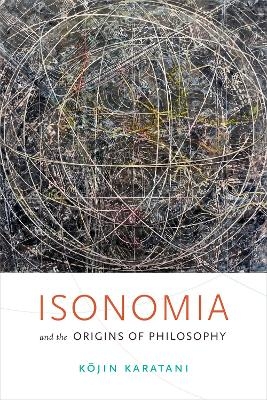
Isonomia and the Origins of Philosophy
Duke University Press (Verlag)
978-0-8223-6885-4 (ISBN)
In Isonomia and the Origins of Philosophy—published originally in Japanese and now available in four languages—Kōjin Karatani questions the idealization of ancient Athens as the source of philosophy and democracy by placing the origins instead in Ionia, a set of Greek colonies located in present-day Turkey. Contrasting Athenian democracy with Ionian isonomia—a system based on non-rule and a lack of social divisions whereby equality is realized through the freedom to immigrate—Karatani shows how early Greek thinkers from Heraclitus to Pythagoras were inseparably linked to the isonomia of their Ionian origins, not democracy. He finds in isonomia a model for how an egalitarian society not driven by class antagonism might be put into practice, and resituates Socrates's work and that of his intellectual heirs as the last philosophical attempts to practice isonomia's utopic potentials. Karatani subtly interrogates the democratic commitments of Western philosophy from within and argues that the key to transcending their contradictions lies not in Athenian democracy, with its echoes of imperialism, slavery, and exclusion, but in the openness of isonomia.
Kōjin Karatani is an internationally renowned theorist and philosopher. Previously, he was a professor at Hosei University in Tokyo, Kinki University in Osaka, and Columbia University. He is the author of numerous books, including The Structure of World History: From Modes of Production to Modes of Exchange and Origins of Modern Japanese Literature, both also published by Duke University Press.
Translator's Note vii
Map viii
Author's Preface to the Japanese Edition ix
Introduction
Universal Religion 1
Ethical Prophets 5
Exemplary Prophets 7
1. Ionian Society and Thought
Athens and Ionia 11
Isonomia and Democracy 14
Athenian Democracy 17
State and Democracy 20
Colonization and Isonomia 22
Iceland and North America 26
Isonomia and Council 31
2, The Background of Ionian Natural Philosophy
Natural Philosophy and Ethics 35
Hippocrates 39
Herodotus 42
Homer 46
Hesiod 51
3. The Essential Points of Ionian Natural Philosophy
The Critique of Religion 56
Self-Moving Matter 58
Poiesis and Becoming 62
4. Post-Ionian Thought
Pythagoras 68
Heraclitus 80
Parmenides 87
Post-Eliatics 96
5. Socrates and Empire
The Athenian Empire and Democracy 103
Sophists and Rule by Rhetoric 107
The Trial of Socrates 110
The Riddle of Socrates 114
Daimon 118
The Socratic Method 121
Plato and Pythagoras 125
The Philosopher-King 127
Isonomia and the Philosopher-King 130
Appendix. From Structure of World History to Isonomia and the Origins of Philosophy 135
Timeline of the Ancient World 141
Notes 143
Bibliography 155
Index 159
| Erscheinungsdatum | 28.09.2017 |
|---|---|
| Übersetzer | Joseph A. Murphy |
| Zusatzinfo | 1 map |
| Verlagsort | North Carolina |
| Sprache | englisch |
| Maße | 152 x 229 mm |
| Gewicht | 340 g |
| Themenwelt | Geisteswissenschaften ► Philosophie ► Philosophie Altertum / Antike |
| Geisteswissenschaften ► Religion / Theologie | |
| Sozialwissenschaften ► Politik / Verwaltung ► Politische Systeme | |
| Sozialwissenschaften ► Politik / Verwaltung ► Politische Theorie | |
| ISBN-10 | 0-8223-6885-4 / 0822368854 |
| ISBN-13 | 978-0-8223-6885-4 / 9780822368854 |
| Zustand | Neuware |
| Haben Sie eine Frage zum Produkt? |
aus dem Bereich


